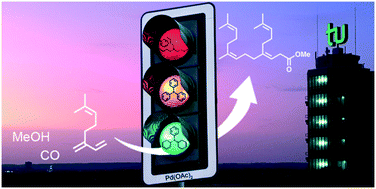Palladium-catalysed carboxytelomerisation of β-myrcene to highly branched C21-esters†
Abstract
The palladium-catalysed carboxytelomerisation of a branched 1,3-diene with alcohols is herein presented. By applying the renewable β-myrcene as a model substrate, access to highly branched industrially relevant C21-esters in a 100% atom economical way is thereby established. Based on a detailed investigation on the influence of different monophosphine ligands, the Tolman angle was determined to be a crucial factor for high chemoselectivity towards the desired ester products. Additionally, through a comprehensive design of experiments (DoE), significant reaction parameters were identified leading to optimised reaction conditions for methanol as the nucleophile. Finally, the generality of these optimised reaction conditions was proven by applying eight different alcohols yielding highly branched esters with yields of up to 99% and excellent chemoselectivities.



 Please wait while we load your content...
Please wait while we load your content...